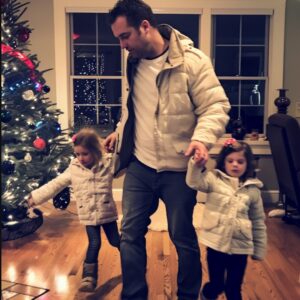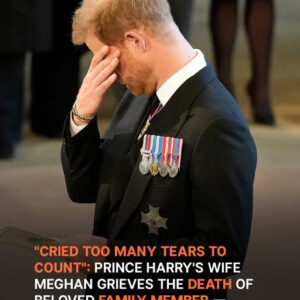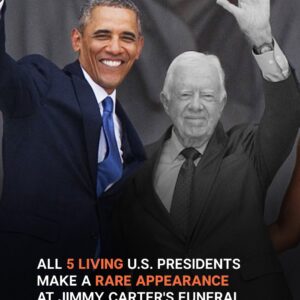James sat in his quiet living room, staring at yet another letter addressed to his estranged son, Andrew. It had been years since they’d spoken—years of silence since the rift between them tore their relationship apart. With a heavy sigh, James licked the stamp and pressed it onto the envelope.
For over a decade, he had been sending letters, hoping for reconciliation, but there was never a reply. Not a word.
That day, as James sifted through his mail, one envelope caught his attention. His hands trembled as he tore it open, revealing a Polaroid. There was Andrew, smiling with his arm around his wife. Their two young sons stood in front, beaming with pride. For a moment, James felt a glimmer of hope. Was this his son’s way of reaching out, of mending the broken bond?
But when James flipped the photo, his heart sank. Scrawled on the back were words that cut deeper than any silence: “James, you’ll never be a part of this family. Stop sending me letters. Soon, nobody will be here to receive them at this address.”
James’s breath caught in his throat. Were they moving? Was this his son’s final way of cutting ties? Questions swirled in his mind, but the cryptic message gnawed at him. He couldn’t ignore it. After years of distance, this message demanded answers.
The next morning, James made up his mind. He packed a bag, got in his car, and began the eight-hour drive to Andrew’s home.
As the miles passed, memories of their fractured relationship resurfaced. The painful moments replayed in his mind, especially the fight that had torn them apart.
Ten years earlier, James had been at home when his son walked in, his expression dark.
“What the hell is going on here?” Andrew’s voice boomed, startling James. He scrambled to pull his shirt on, his face flushing with guilt. The woman beside him—his secretary—hastily gathered her things and fled the room.
“Andrew, it’s not what it looks like,” James stammered, desperation in his voice.
Andrew’s glare burned through him. “You’re in Mom’s bed—with your secretary—while she’s in the hospital fighting for her life? You disgust me.”
“Please, don’t tell your mother,” James begged. “It was a mistake. I’m sorry.”
Andrew’s face twisted with fury. “You don’t deserve her. I won’t tell her. But you will go to that hospital and hold her hand. You’ll be by her side until the end. And then you’ll stay out of my life.”
Three months later, Vivienne passed away. At her funeral, Andrew gave a heartfelt eulogy that brought everyone to tears—everyone except James, who stood silently in the corner, unable to meet his son’s gaze. After the service, Andrew approached him.
“You’ll never see me again,” he said coldly before walking away.
The memory of those words haunted James as he pulled into Andrew’s driveway. He stepped out, his hands trembling as he knocked on the door.
A woman answered—a face he recognized from the Polaroid. “You’re Andrew’s wife, right?” James asked, his voice unsteady. “I’m James, his father. May I see him?”
Her eyes softened with recognition. “Yes, I’m Ashley. Please come in, but…” She hesitated. “Andrew’s not here.”
James’s heart sank. “Where is he? Work?”
Ashley shook her head. “No… he’s in the hospital. Both his kidneys have failed, and he’s waiting for a transplant.”
James felt the weight of her words like a punch to the gut. “The hospital? My son is dying, and you’re telling me I can’t see him?”
Ashley sighed. “It’s not that simple. He doesn’t want to see you. He’s already under so much stress, and I can’t risk upsetting him.”
“Please,” James begged. “Let me help. I’ll speak to the doctors.”
Reluctantly, Ashley agreed. They drove to the hospital together, where Dr. Mullins explained Andrew’s dire condition. “We need to find a donor immediately,” the doctor said gravely. “Time is running out.”
James didn’t hesitate. “I’ll donate my kidney.”
Ashley’s eyes widened. “He’ll never accept it if he knows it’s from you.”
“Then don’t tell him,” James insisted. “Let it be anonymous. Please, Ashley—I need to do this for him.”
After initial tests, James was found to be a match. The surgery was scheduled quickly. Andrew, unaware of his father’s involvement, expressed gratitude to the “anonymous donor” who had saved his life.
Weeks passed, and Andrew’s recovery progressed well. One evening, as Ashley sorted the mail, Andrew noticed an unopened letter. He recognized the handwriting immediately.
“It’s from him,” Andrew muttered, bitterness creeping into his voice. “Why can’t he just leave me alone?”
Ashley hesitated before blurting out, “Andrew, stop. You need to know the truth. Your father was the donor.”
Andrew froze, the letter slipping from his hands. “What? No. That’s not possible.”
“He came here weeks ago. When he learned you needed a kidney, he insisted on donating. He begged me to keep it a secret. I couldn’t tell you before, but now you need to know.”
Andrew’s mind swirled with conflicting emotions. Anger, confusion, and something else—something that felt uncomfortably like gratitude. After a long silence, he spoke.
“I need to see him.”
The next day, Andrew drove to his father’s house. His fist pounded on the door, but there was no answer. A voice called out from behind him.
“Are you looking for James?”
Andrew turned to see a neighbor. “Yes. I’m his son. Where is he?”
The woman’s expression softened with sympathy. “I’m sorry. James passed away a few days ago. He got an infection after the surgery. He didn’t make it.”
Andrew staggered back, the words hitting him like a tidal wave. For years, he had convinced himself that his father’s absence wouldn’t matter. But now, faced with the finality of his loss, the ache in his chest told a different story.
He had been ready to forgive, ready to rebuild what was broken. But it was too late.
“I was too late…” Andrew whispered, tears streaming down his face.
Sometimes, the chance for reconciliation slips away before we’re ready. James’s final sacrifice showed his love, even when words failed. Forgiveness may not always come in time to be spoken, but it can still heal wounds left behind.





